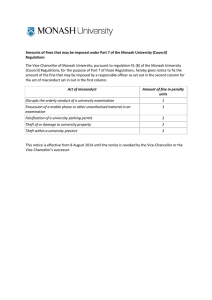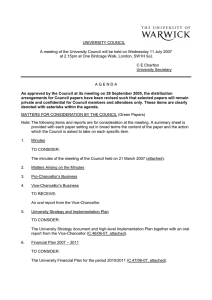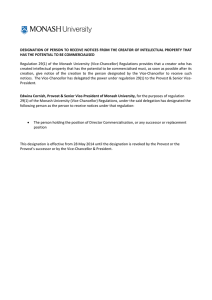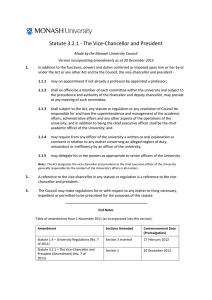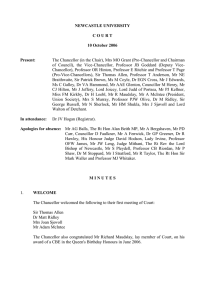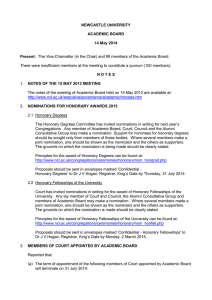THE FOLLOWING DOCUMENTS RELATE TO GENERAL INFORMATION FOR ALL LEVELS OF
advertisement
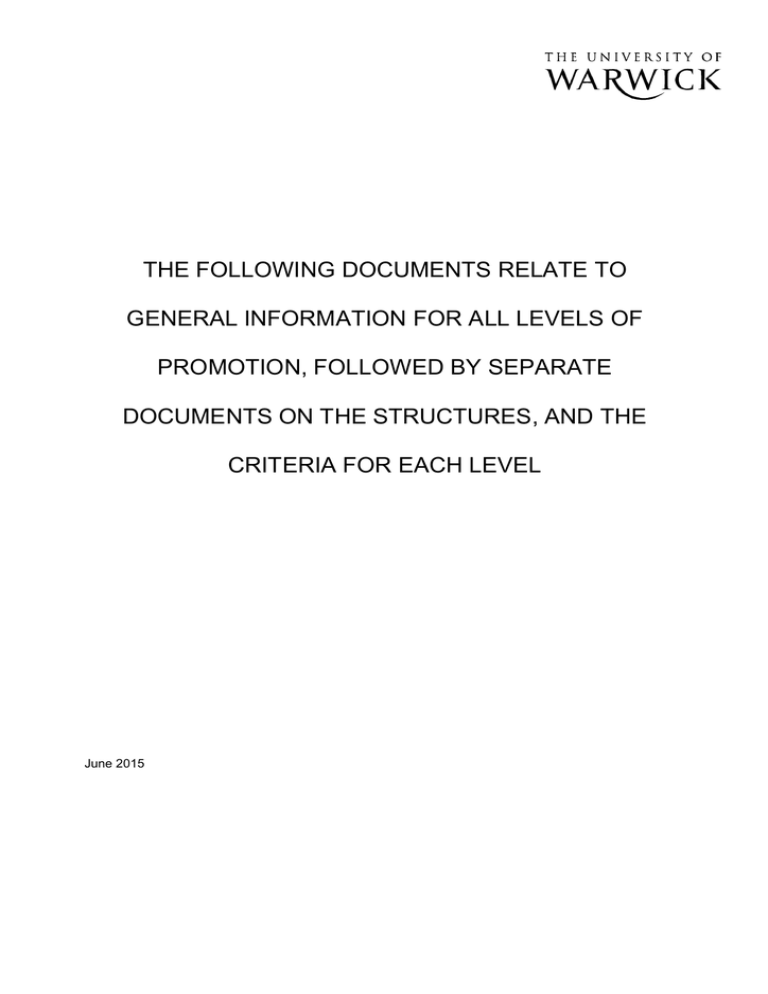
THE FOLLOWING DOCUMENTS RELATE TO GENERAL INFORMATION FOR ALL LEVELS OF PROMOTION, FOLLOWED BY SEPARATE DOCUMENTS ON THE STRUCTURES, AND THE CRITERIA FOR EACH LEVEL June 2015 UNIVERSITY OF WARWICK 1. General It is recommended that Heads of Department should seek advice from other senior colleagues when considering bids for promotions, usually by forming a Promotions group within the department or using senior management meetings as a mechanism. In accordance with the University’s Single Equality Scheme, the Academic Staff Committee is concerned to ensure that only relevant considerations are taken into account in coming to its decisions. When reviewing a candidate’s record, consideration will be given to any special circumstances which may have resulted in a lack of opportunity for any candidate (or groups of candidates) to perform to their full potential in any area of activity. For example, time taken away from work because of family responsibilities for the bringing up of children or care of relatives could have delayed career development; or time devoted to developing a new course or running Universitywide activities may have limited the opportunities for research. Care is taken to ensure that equal opportunity factors are taken into account when each area of activity is considered. Any member of staff that considers special circumstances may impact on their promotion submission may declare these in their Personal Statement. Such information will be kept confidential and will only be seen by members of staff involved in the promotion process and referees. Oral feedback, if requested, will be given to unsuccessful candidates and their Head of Department by the Vice-Chancellor or a nominated member of the Academic Staff Committee/Vice-Chancellor’s Advisory Group. 2. Schedule Promotion cases should be submitted electronically by the Head of Department to the Academic Processes team in Human Resources by 30 September 2015. Guidance on the structure of promotion cases and criteria for promotion at all levels is attached, along with a checklist (Appendix 2) of the required documents needed at each promotion level which must be completed and returned with your submissions. A reference checklist must also be completed for each promotion case where references are required. Promotion cases are considered during the Autumn and Spring Terms. All Professorial level cases are considered by the Vice-Chancellor’s Advisory Group with all other cases being considered by the Academic Staff Committee. It is hoped that decisions on promotions can be published by the end of the Spring Term where possible. However, candidates should be aware that some cases may not be completed until early in the Summer Term. Promotions in the Academic Year 2015/16 will take effect from 1 June 2016. In exceptional cases, the Vice-Chancellor has discretion to consider promotion cases outside the normal cycle. 3. Eligibility In seeking a promotion, the following general points should be borne in mind: (a) Promotions will not normally be considered until the third year of the individual’s appointment or last promotion in the University. In exceptional cases, the ViceChancellor has discretion to consider earlier promotion. 2 Note: This does not debar members of staff from applying for advertised posts at the University on an equal basis with outside candidates. 4. (b) Where a candidate with a significant career profile has been appointed relatively recently, there must still be a valid case that the calibre of their contribution at Warwick matches the promotion criteria. The evidence for this could include ongoing contributions but should not rely on anticipation of forthcoming work. (c) A promotion case should normally not be resubmitted in the year following a rejected recommendation, unless there is a new and significant reason for early resubmission, or unless the Vice-Chancellor invites resubmission. (d) Where the Head of Department decides not to support a promotion case, it is open to the individual member of academic staff to put forward a self-proposed application to the Academic Staff Committee/Vice-Chancellor’s Advisory Group (see paragraph 4 below on the process in self-proposed cases). Self-Proposed Cases Promotion cases normally come from the Head of Department, but may exceptionally be self-proposed. The procedures relating to self-proposals are as follows: (a) If a Head of Department receives a request from a member of staff to nominate themselves for a personal promotion and decides that he/she is not willing to put forward such a nomination, it is the responsibility of the Head of Department to inform the member of staff that they are unwilling to make the nomination, and of the existence of the procedures for self-proposal. (b) In such cases the member of staff should submit a full case, following the procedures set out in the appropriate guidance document. A separate statement to the Vice-Chancellor should also be provided outlining the reasons for the case being brought on a self-proposed basis. This statement will not be circulated to the referees. On receipt of these papers, the Academic Staff Committee/ViceChancellor’s Advisory Group will consult the Head of Department on your submission and, if judged necessary, other Professors as appropriate. (c) The case will then remit to the Academic Staff Committee/Vice-Chancellor’s Advisory Group in line with the procedure set out in the guidance for the appropriate level. June 2015 3
